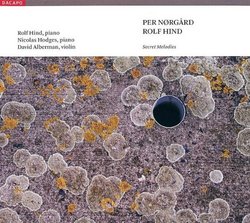| All Artists: Per Norgard, Rolf Hind, Nicolas Hodges Title: Per Nørgård: Secret Melodies Members Wishing: 0 Total Copies: 0 Label: Da Capo [Naxos] Original Release Date: 1/1/2007 Re-Release Date: 11/20/2007 Genre: Classical Styles: Chamber Music, Historical Periods, Classical (c.1770-1830), Instruments, Strings Number of Discs: 1 SwapaCD Credits: 1 UPC: 636943603727 |
Search - Per Norgard, Rolf Hind, Nicolas Hodges :: Per Nørgård: Secret Melodies
CD Details |
CD ReviewsSeveral of Norgard's piano works complemented by chamber mus Christopher Culver | 10/18/2008 (3 out of 5 stars) "This Dacapo disc was originally conceived by the label as a new recording of Per Norgard's piano works performed by the British virtuoso Rolf Hind. In the end, it became a more general chamber music CD, and even came to feature one of Hind's own compositions. I regret that the focus ultimately wasn't entirely on Norgard's output for the piano--it would be nice to see "Grooving" and the piano Fragments in print again--but what we get is nonetheless good listening.
"Achilles and the Tortoise" for solo piano (1983) is an exciting piece where two musical lines get oh so close to each other, but never manage to come together. The whole thing is played lightning fast, and the virtuoso demands are considerable. Fans of Ligeti's piano etudes will probably love this. The performance here is splendid, but one might also seek out the recording by the dedicatee Yvar Mikhashoff on the CD included with The Music of Per Norgard: Fourteen Interpretative Essays. "Remembering" for solo piano (1989) is a rearrangement of the first movement of the viola concerto "Remembering Child". Norgard felt that the ambiguity inherent in the two musical lines of the concerto would be better perceived in a solo piano form, and the piece is indeed quite different in character. At various points the pianist is instructed to whistle along with the pianism, and he even ends on a downward glissandi whistle. "Stadier" for piano solo (2002) is a short three-movement work in which the musical line consists of a simple infinity series in various forms. Norgard writes that it is appropriate for even beginning pianists, showing his unusual dedication to amateur performance among contemporary composers. While the multidimensional weave of the infinity series in all its many layers is stunning in works like the Symphony No. 3 and "Twilight", sometimes it's nice just to hear a fairly straightforward rendition of the basic process. So, I go back to "Stadier" fairly often (as well as other "automatic" pieces like the "3 Agnus Dei Motets"). "Unendlicher Empfang" for two pianos (Unending Reception, 1997) begins with the simplest of touches but then grows into immense complexity as ideas spring from each of the pianos, which are continually maintained and renewed. The work also includes four metronomes, which appear about halfway through. I like this piece, for it occasionally offers the bleep-bloops that I love so much from 1950s serialism, but its overall scheme is the natural, organic music (and ambiguity!) that Norgard has always pursued. Nicholas Hodges is the second pianist here. Norgard's solo "Sonata" (1993) was originally written for the violist Nobuko Imai, but the German violinist Heinrich Hoerlein arranged it for violin with the composer's approval. David Alberman, widely known for his stint with the Arditti Quartet, performs here. Throughout the piece a melody seems to assert itself, only to then be revealed as part of a larger melody. While perhaps one of Norgard's minor works, the Sonata is exciting with its clear dramatic arc and the multifaceted personality of the solo instrument. Still, I prefer the original for viola (available on a BIS disc) a bit more than the violin arrangement. I won't comment on the Hind piece, since I'm still working my way through Norgard's oeuvre on disc. All in all, I give this disc three stars. The music is quite good--and I return to a couple of these pieces often--but nothing is as awesome as his symphonies, concertos or various choral works." |

